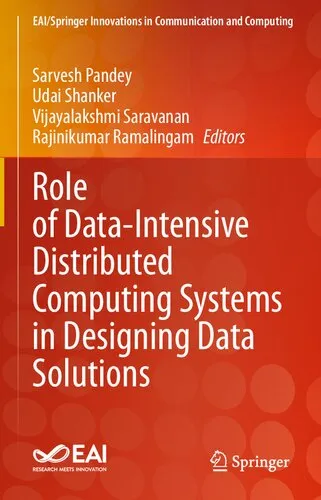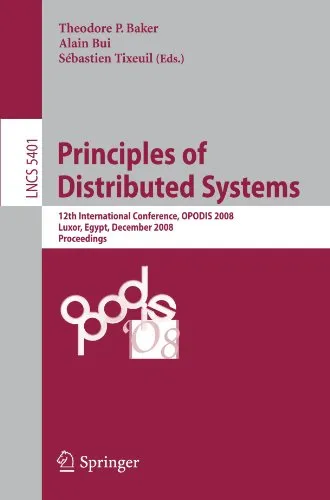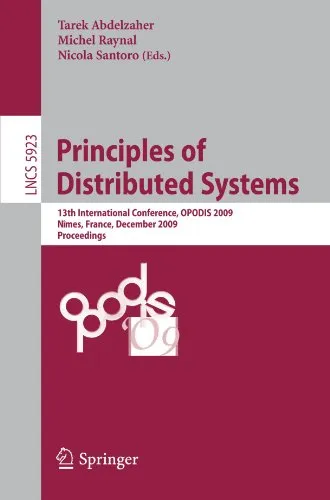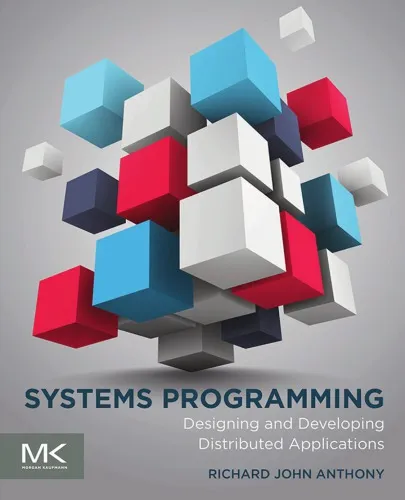Principles of Distributed Systems: 8th International Conference, OPODIS 2004, Grenoble, France, December 15-17, 2004, Revised Selected Papers
4.0
بر اساس نظر کاربران

شما میتونید سوالاتتون در باره کتاب رو از هوش مصنوعیش بعد از ورود بپرسید
هر دانلود یا پرسش از هوش مصنوعی 2 امتیاز لازم دارد، برای بدست آوردن امتیاز رایگان، به صفحه ی راهنمای امتیازات سر بزنید و یک سری کار ارزشمند انجام بدینکتاب های مرتبط:
معرفی کتاب
کتاب Principles of Distributed Systems: 8th International Conference, OPODIS 2004, Grenoble, France, December 15-17, 2004, Revised Selected Papers مجموعهای از مقالات علمی و پژوهشی است که در هشتمین کنفرانس بینالمللی OPODIS ارائه شده و موضوعات پیشرفته مرتبط با سیستمهای توزیعشده را پوشش میدهد. این کتاب با ویرایش نهایی Teruo Higashino گردآوری شده و یکی از منابع ارزشمند برای محققین و دانشجویان علاقمند به معماری سیستمهای توزیعشده، الگوریتمها و چالشهای موجود در این حوزه به شمار میآید.
خلاصهای از محتوای کتاب
این کتاب شامل ۲۵ مقاله به دقت انتخابشده از بین مقالات ارائهشده در کنفرانس OPODIS 2004 در شهر گرونوبل، فرانسه است. این مقالات موضوعاتی نظیر الگوریتمهای توزیعشده، fault tolerance، communication protocols، مدیریت منابع در سیستمهای توزیعشده و یکپارچهسازی سیستمها را بررسی میکنند. همچنین در این مقالات به کاربردهای عملی و تئوریهای پشتیبان این حوزه پرداخته شده است.
یکی از اهداف اصلی این اثر، تشویق به تعامل میان محققان حوزههای مختلف سیستمهای توزیعشده و ارائه دیدگاههای تازه برای پیشبرد چالشهای این حوزه است. بررسی مسائلی نظیر هماهنگسازی منابع، کارایی در مقیاس بالا، و تضمین امنیت در محیطهای توزیعشده از جمله نکات برجسته در این کتاب است.
نکات کلیدی
- بررسی الگوریتمهای پیشرفته در محیطهای توزیعشده
- مطالعه fault tolerance و راهکارهای مقابله با خطای ناشی از اجزای مختلف سیستم
- تحلیل communication protocols و بهینهسازی ارتباطات میان گرهها
- معرفی رویکردهای نوآورانه برای مدیریت منابع در شبکههای توزیعشده
- توجه به مسائل امنیتی و تضمین حریم خصوصی در سیستمهای توزیعشده
نقلقولهای منتخب از کتاب
“Distributed systems are the foundation of modern computing. Understanding their principles is key to building secure, scalable, and resilient infrastructures.”
“Concurrency and fault tolerance are not just challenges; they are opportunities to design better systems.”
“Exploring the boundaries of distributed algorithms allows us to push the limits of what’s technically possible.”
چرا این کتاب مهم است؟
این کتاب فقط مجموعهای از مقالات علمی نیست؛ بلکه یک راهنمای جامع برای علاقهمندان به سیستمهای توزیعشده و چالشهای مرتبط با آن نیز به شمار میآید. رشد روزافزون فناوری و ارتباطات دیجیتال، نیاز به طراحی و پیادهسازی سیستمهای توزیعشده امن و مقاوم را بیشتر از همیشه روشن کرده است. این کتاب با رویکرد ترکیبی از تحقیقات نظری و عملی، به ارائه راهحلهای خلاقانه و بینشهای جدید پرداخته و محققان و کارشناسان این حوزه را به مطالعه عمیقتر ترغیب میکند.
اگر به دنبال فهم بهتری از اصول طراحی سیستمهای توزیعشده، چگونگی مدیریت منابع و بهینهسازی الگوریتمها هستید، این کتاب از جمله منابعی است که نباید از دست دهید. از طرفی، این مجموعه ابزاری مفید برای توسعهدهندگان و دانشجویانی است که در مسیر خود به دنبال درک چالشها و فرصتهای موجود در حوزه سیستمهای توزیعشده هستند.
Introduction
Welcome to "Principles of Distributed Systems: 8th International Conference, OPODIS 2004, Grenoble, France, December 15-17, 2004, Revised Selected Papers", a profound compilation of research and academic contributions in the ever-evolving field of distributed systems. This book serves as a comprehensive overview of the discussions and significant advancements presented at the 8th International Conference on Principles of Distributed Systems (OPODIS), held in Grenoble, France. By integrating revised, peer-reviewed research and papers from the event, the volume offers both practitioners and researchers a robust foundation to explore pivotal topics in distributed systems.
Distributed systems have witnessed exponential growth in importance, impacting crucial domains such as cloud computing, large-scale data processing, and decentralized networks. This book captures the spirit of collaboration and innovation that drives this field. In the chapters that follow, you will encounter theoretical models, practical methodologies, and novel algorithms presented by experts who are at the forefront of distributed systems research.
Detailed Summary of the Book
The volume includes a carefully curated selection of papers that have undergone rigorous peer review and revision post-conference. The topics addressed span key challenges of distributed computing, including synchronization, fault tolerance, communication protocols, system dependability, and consistency models.
Each chapter presents unique contributions addressing specific problems, backed by theoretical analysis and simulation-based evaluations. Discussions around reliable communication in large-scale networks, efficient data replication techniques, and solutions for achieving consensus in the presence of failures highlight the practical relevance of the presented concepts. Another noteworthy component focuses on fundamental properties of system design, including scalability, consistency, and security.
While technical in nature, the discussions are framed to make them accessible to researchers and graduate students entering the field. Moreover, seasoned professionals will find the content thought-provoking, spurring ideas for future exploration and application in real-world distributed environments.
Key Takeaways
- A deep understanding of synchronization techniques and their application in distributed systems.
- Novel fault-tolerant algorithms capable of sustaining operations under failure scenarios.
- Insights into scalable and efficient communication protocols for diverse domains.
- Theoretical models underlining the core principles of consistency and reliability in decentralized settings.
- Applied case studies and experimental results that bridge theory and practice.
Famous Quotes from the Book
"The complexity of distributed systems lies in their ability to maintain coherence despite the inherent unreliability of individual components."
"Fault tolerance is not merely a feature of distributed systems—it is their defining characteristic."
"Scalability in distributed systems is not just about adding more resources; it's about maintaining efficiency as the system expands."
Why This Book Matters
"Principles of Distributed Systems" is more than just a collection of research papers—it is a testimony to the dynamic progress in the field. As distributed systems form the backbone of major technological advancements today—ranging from cloud infrastructures to blockchain—this book offers a timeless resource for understanding their core principles. The insights provided not only address current challenges but also lay the groundwork for innovations in the design and management of future distributed systems.
By studying this book, readers will gain clarity on the theoretical underpinnings of distributed computing while also appreciating the practical significance of these solutions in real-world applications. The lessons learned from OPODIS 2004 continue to inspire groundbreaking developments in the field, making this book an indispensable asset for academics, researchers, and industry professionals alike.
دانلود رایگان مستقیم
شما میتونید سوالاتتون در باره کتاب رو از هوش مصنوعیش بعد از ورود بپرسید
دسترسی به کتابها از طریق پلتفرمهای قانونی و کتابخانههای عمومی نه تنها از حقوق نویسندگان و ناشران حمایت میکند، بلکه به پایداری فرهنگ کتابخوانی نیز کمک میرساند. پیش از دانلود، لحظهای به بررسی این گزینهها فکر کنید.
این کتاب رو در پلتفرم های دیگه ببینید
WorldCat به شما کمک میکنه تا کتاب ها رو در کتابخانه های سراسر دنیا پیدا کنید
امتیازها، نظرات تخصصی و صحبت ها درباره کتاب را در Goodreads ببینید
کتابهای کمیاب یا دست دوم را در AbeBooks پیدا کنید و بخرید
1203
بازدید4.0
امتیاز0
نظر98%
رضایتنظرات:
4.0
بر اساس 0 نظر کاربران
Questions & Answers
Ask questions about this book or help others by answering
No questions yet. Be the first to ask!















